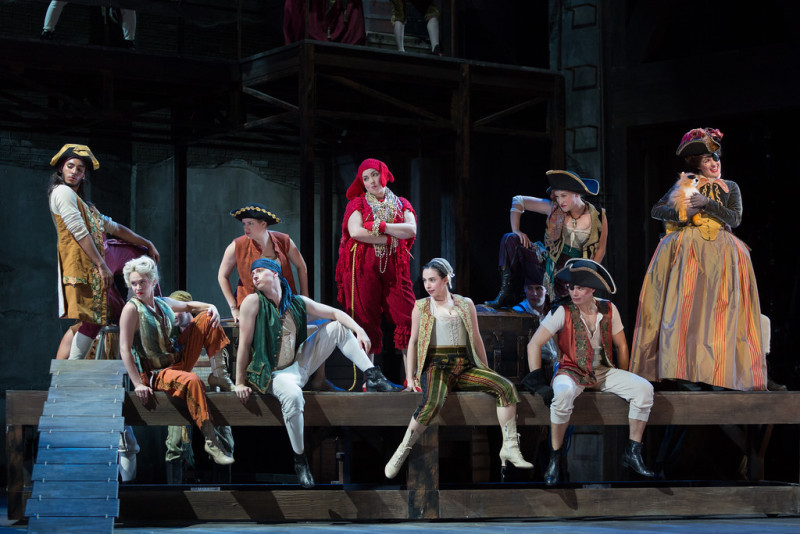‘Candide’ Overcomes ‘Relentless Tinkering’
Review By PAT THORPE for www.allotsego.com

The musical “Candide,” now in a glittering production at the Glimmerglass Festival, is one of Broadway’s favorite death and resurrection stories. When it opened in 1956, it boasted a roster of bold-face talent: Tyrone Guthrie; Leonard Bernstein; Dorothy Parker; Richard Wilbur; Lillian Hellman. In spite of irresistible music and some of the wittiest lyrics ever to reach the stage, “Candide” closed after 73 performances.
In 1974, with a rewritten book by Huge Wheeler and more witty lyrics by Steven Sondheim, the flop flipped and ran for 2 years. In 1982, Hal Prince convinced New York City Opera that “Candide” was actually an operetta, so more music and witty lyrics were written. In 1989, Bernstein created a concert version with less text, more music and more philosophy, optimistically titled the Final Revised Version; far from final, it is performed by symphony orchestras around the world. Revisions continue up to the Glimmerglass “Candide.” At each stage, musical numbers are moved, lyrics reworked, libretto updated.
All the relentless tinkering points to the central problem of “Candide.”
Voltaire’s slender satire from 1759 sends its hero sailing across the globe in search of love and truth, but mostly to furnish targets for Voltaire’s outrage: Greed and corruption in politics; abuse by religious orders; the futility of war; the horrors of slavery and colonialism, all attacked with suave wit and evenhanded vitriol. The characters are insubstantial as cartoons, and like cartoons they die and return to life repeatedly. Motion is a substitute for plot and the result can be travel fatigue.
However, the Glimmerglass “Candide” is so entertaining that occasional narrative let-downs might not be noticed. Kathryn Lewek as Cunegonde is the leading gem of the cast, with a superb soprano for the considerable demands of the role; she brings surprising depth of feeling and charm to a self-infatuated Material Girl. Helping her to survive is Marietta Simpson, a delight as the outrageous Old Woman.
Andrew Stenson has a sweet tenor and guileless face for the optimistic “Candide,” but is a little too bland to keep our attention, especially next to sidekicks like the pessimistic Martin, played to furious perfection by Matthew Scollin. David Garrison thoroughly fulfills our vision of Voltaire as he narrates the action and gracefully doubles as Dr. Pangloss.
Bernstein ransacked European musical history to create a pastiche of Old World dances like the mazurka, schottische and gavotte; those familiar rhythms are draped in dazzling lyrics and tunes you can’t stop humming. It is thrilling to hear this music beautifully played by a full orchestra, conducted with verve by Joseph Colaneri. The cavernous and versatile wharf-side warehouse set by James Noone sums up the endless cycle of travel endured by our characters. Jennifer Moeller has designed luxurious 18th century-style costumes for the principle characters, while the large ensemble resembles a half-dressed commedia dell’arte troupe.
In the finale, Bernstein abandons Voltaire entirely. Setting Richard Wilbur’s translation of the famous last line, he creates a soaring anthem of hope in everything we love and live for.
“We’ll build our house,
“And chop our wood,
“And make our garden grow.”

